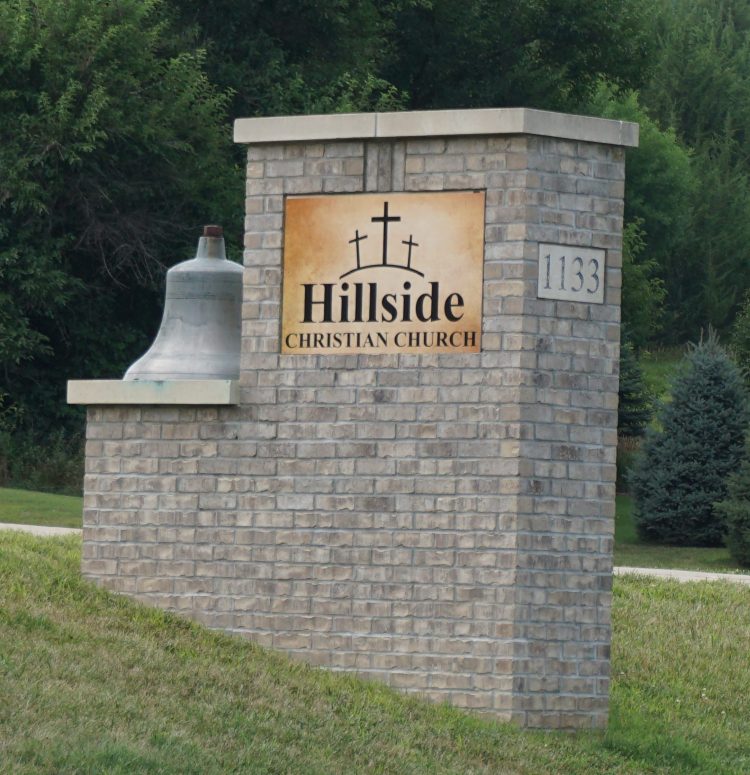
Hillside Christian Church
Beliefs & Practices
Hillside Christian Church is affiliated with the Christian churches and churches of Christ belonging to what is commonly called the Restoration Movement, which seeks the unity of all believers on the basis of the New Testament Scriptures. Our heritage is both evangelical and distinctive, in that our study of the New Testament makes us very cautious toward extra biblical creeds, and unwilling to use them as tests of an individual’s salvation or church membership. We recognize, though, that the criteria of leadership is more extensive than the criteria of salvation and fellowship, and therefore offer the following summary of our core beliefs. Though members of the church are not required to agree with all these statements, the elders and minister(s) of the Church affirm that:
- The Bible, consisting of the Old and New Testament Scriptures, is the Word of God written and is God-breathed, and therefore is without error in the original manuscripts. The Bible is completely true, authoritative, and profitable for faith and life.
Psalm 119:160; John 14:26, 17:17; 2 Timothy 3:16 - There is one true God, who is spirit, eternal, omniscient, omnipotent, and holy. God is the Creator, Ruler, and Redeemer of all creation. God is revealed to us as Father, Son, and Holy Spirit, three Persons possessing equally and eternally the divine nature and attributes of God.
John 4:24; Psalm 90:2; Romans 1:20; 1 Timothy 1:17; Colossians 1:17; Revelation 4:8, 11; 2 Corinthians 13:14 - Man is a union of body and soul, and is created in the image of God for the purpose of knowing, loving, and glorifying his Creator. To be human is to be rational and moral, exercising limited freedom and personal responsibility under divine providence and the moral order. The conception of each human being is an act of new creation by God, in a state of innocence (rather than guilt or merit) and naivete (rather than depravity, sinfulness, or virtue). Neither human nature nor the flesh (the physical body) is inherently sinful, yet sin corrupts individual character, especially through the flesh as an avenue for the entrance of sin and its consequences.
Genesis 2:7, 1:27; Psalm 139:13; Zechariah 12:1; Romans 5:12; Galatians 5:17 - Jesus Christ is the Son of God, conceived of the Holy Spirit and born of the virgin Mary; He is God the Word incarnate. He lived a perfectly sinless life, and in His suffering and death on the Cross endured for others the justice of God against sin. He was raised from the dead with a glorified body, and now reigns over His creation as Lord and Mediator.
John 1:1, 14; Philippians 2:5-11; Romans 3:24-26; 2 Corinthians 5:21; 1 Corinthians 15:3-4; Romans 8:34 - According to the gracious promises of God in the New Testament, the steps toward salvation are faith in Jesus as the Son of God, Lord, and Christ; repentance from sin; and confession of Jesus as the Christ followed by baptism by immersion in water. These faithful responses lead to the forgiveness of sins and the gift of the indwelling Holy Spirit.
Romans 5:1, 10:9, 13; John 3:5; Acts 2:38; Romans 6:1-4; Galatians 3:27; Ephesians 4:5; Colossians 2:11-13; Titus 3:5 - The Holy Spirit guided the biblical writers, protecting the truthfulness and sufficiency of the Scriptures. He accomplished miracles, signs, and wonders in the apostolic church; He convicts the world of sin, righteousness, and judgment; and He regenerates and indwells believers in Christ. He strengthens Christians unto holiness, and through their sanctification leads them to grow in the grace and knowledge of Christ, but does not impart saving faith, divine illumination, or (after the apostolic era) miraculous gifts.
John 14:26; 2 Peter 1:21; Hebrews 2:4; John 16:8, 7:37-39; 1 Corinthians 6:19; Romans 8:11-13; 1 Corinthians 13:8-10 - Jesus established His Church to present the gospel to the world. The Church acknowledges Jesus Christ as Savior and Lord, and the authority of the New Testament is the basis of the Church’s identity and unity as it seeks to speak the truth in love. Christians should follow the enduring principles found in the example and teaching of the New Testament concerning the faith and life of the community of believers. The local church is to be led by multiple elders/overseers/pastors, with no ecclesiastical structure governing multiple churches. The church gathers on the first day of the week for teaching, fellowship, the breaking of bread, prayer, and worship.
Matthew 16:16-18, 28:18-20; John 17:20-21; Acts 4:12, 17:11; Ephesians 2:20, 4:11-16; Acts 20:28; 1 Timothy 3:1, 5:17; Acts 2:2, 20:7 - Jesus Christ will return to complete the judgment and redemption of creation, and every person will dwell eternally in Hell or in Heaven.
1 Thessalonians 4:14-17; 2 Timothy 4:1; John 5:26-29; Revelation 20:15; Romans 8:11; Revelation 21:3-4
